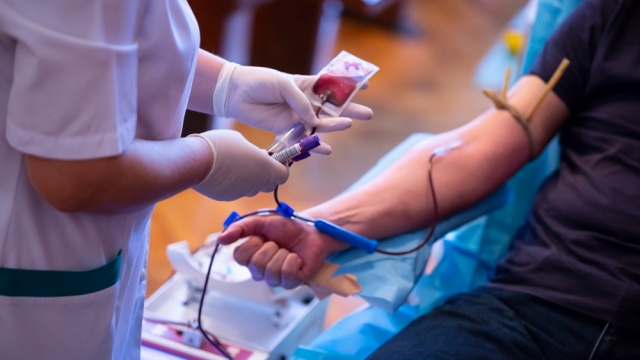The FDA announced that moving forward, blood donor eligibility will be determined via individual risk-based assessment questionnaires, regardless of one's background, gender or sexual orientation. This update in policy marks the latest chapter in the FDA's removal of restrictions that have historically prevented gay and bisexual men from donating blood.
During the height of the AIDS epidemic in the 80s, the U.S. government ban on blood donations from men who had sex with men. At the time, this was due to a lack of HIV testing capabilities. Over time, this was viewed by members of the LGBTQ community as discriminatory.
In 2015, the FDA removed the ban, replacing it with a requirement of one year of abstinence. That was reduced to three months in 2020.
SEE MORE: Blood centers work to adapt to new FDA donor screenings
"Any time more people are able to enter the donor pool safely, that is a really good thing, because less than 5% of the population actually donates blood. And, you know, we need more people to step forward and do it," Forbes said.
With time-based referrals now eliminated, Forbes says blood centers across the country are excited about the opportunity to shore up the blood supply, which took a hard hit during the COVID-19 pandemic and is relied upon in emergencies.
"All too often, we see these mass tragedies happening around the country, you know, blood donations playing a role in helping save patients' lives who have been involved in situations like that. But it's the donor who came in just a few days prior that's helping save those patients' lives," Forbes said.
For Forbes, the policy update is extra special, as OneBlood, along with the American Red Cross and Vitalant, participated in the study that helped the FDA determine if the questionnaire would be an acceptable alternative to a time-based deferral in reducing the risk of HIV among gay and bisexual donors.
"Together, the three of us enrolled over 1,600 gay and bisexual men into the advanced study. And the data from that study was provided to the FDA. And it actually played a role. And it was a big part of their decision making by the FDA to move to this individual assessment of all donors," Forbes said.
Forbes says OneBlood plans to begin implementing the new FDA policy within the next couple of months. But details of the policy update aren't sitting well with everyone.
"FDA for about a decade now has been more or less pretending that it's ending discrimination against gay and bi men while not actually ending that discrimination," California State Senator Scott Wiener said.
SEE MORE: FDA changes blood donor rules for gay and heterosexual donors
Wiener said he and others in the LGBTQ community are taking issue with the policy's deferral of donors who are proactively taking the HIV preventative medication known as PrEP.
"The FDA is saying if you take PrEP and therefore have essentially no risk of HIV, you cannot donate. But if you stop taking PrEP and put yourself at risk of HIV, then you're allowed to donate. It makes no sense. And it will continue to exclude a massive number of gay men from donating," Weiner said.
According to the FDA,while antiretroviral drugs are effective, "Available data has shown that their use may delay the detection of HIV by currently licensed screening tests for blood donations," opening up the possibility for "false negative results."
But Wiener says those taking PrEP to protect their health are not looking to jeopardize anyone else's health, as safety is already top of mind and that such a deferral further demonizes gay and bisexual men.
"As a gay man who takes PrEP, I can tell you for me and everyone I know, we're not going to do anything. None of us wants to put the blood supply at risk," Wiener said.
And that's not the only complaint about the policy update.
"I will say, though, that our blood collection policies are still based on the honor system. Anyone can fill out the questionnaire, the individualized questionnaire they've come up with any way they want. That doesn't necessarily inspire confidence in our public health system or for public safety," Justin Chenette, York county commissioner in Maine said.
SEE MORE: Cancer survivor explains value of platelet donations amid shortage
Chenette argues that while the questionnaire is a step in the right direction, it's kind of unnecessary given that all blood donations are tested.
"I absolutely can see a situation where somebody fills out the questionnaire incorrectly. And guess what? They're going to still test that blood donation and they're going to accept it or not accept it based on the results of the test, not of the questionnaire. So why have the questionnaire," Chenette said.
Ultimately, Chenette says the need for blood donations isn't going away and neither is the desire of folks who want to help their fellow Americans regardless of their sexual orientation.
"Generally, Americans want to give back and help their fellow individuals like we are. We have such a strong sense of community that is almost second to none. And so, we rally when there's a need," Chenette said. "I think we need to take that as progress, recognize that step, thank them for that. And then let's sort of circle back to say, how can we continue to improve."
Trending stories at Scrippsnews.com



